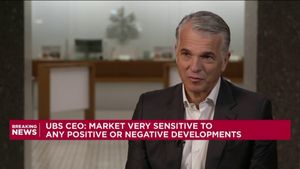Celebrity health and wellness updates are increasingly relevant as high-profile figures like Dame Sheila Hancock and Pamela Anderson openly discuss their personal challenges and triumphs. With the backdrop of Children's Mental Health Week, the importance of communication within families is underscored, addressing the struggles many children face as they navigate mental health issues.
Dame Sheila Hancock, at 91, has recently opened up about her lifelong struggle with anxiety, particularly centered around punctuality. She admits to being 'obsessive' about being on time, often arriving at appointments far too early just to avoid the possibility of being late. "I’m always desperately worried about being late. Obsessive even. I’ll arrive so early... rather than risk being tardy or stuck in traffic," she shared with The Guardian, illustrating how this anxiety has negatively impacted her daily life. Sheila’s frustration culminated during a recent experience where her taxi failed to arrive on time, prompting her to take drastic measures. "I called: ‘Where the hell are you?’" she exclaimed, recounting her hurried attempt to reach her destination, only to arrive ten minutes early after locking herself out of her house. "It’s madness."
Determined to find relief, Hancock has signed up for an NHS anti-anxiety course, expressing her hope to navigate her final years with less stress. "I’d like to spend the last few years of my life being less anxious, if I could. That would be a gift," she noted. Her perspective toward anxiety is refreshing; she emphasizes, "My anxiety is not an illness, just fear... I’m bored of normal emotions being categorised as sickness, honestly." This candid exploration of mental health resonates with many, particularly as public figures take steps to address their own struggles.
Similarly, Pamela Anderson, known for her iconic roles and modeling career, discusses her return to acting and the emotional hurdles she faced. After earning acclaim for her performance as Shelly Gardner in the film 'The Last Showgirl,' Anderson reflects on years of feeling inadequate, admitting she was hard on herself prior to this role. "Before I found this role, I was beating myself up, thinking, 'I just didn’t work hard enough,'" she confided to OK! Magazine. Her resurgence has sparked new ambitions within her, as she seeks to leave behind a legacy her family can be proud of.
"These last few years have been an incredible ride... I’m just happy," Anderson shared, expressing gratitude toward her children, Brandon and Dylan, who supported her return to the spotlight. She describes her career as being at the starting line again, seeking to make the most of her opportunities. This reflects her broader realization: "I guess I’m capable of more, so that's what pushed me." Anderson plans to expand her filmography with projects like the fourth film in the 'Naked Gun' franchise and the thriller 'Rosebush Pruning.'
Against the backdrop of these personal journeys, Children's Mental Health Week, observed from February 3-9, serves as a timely reminder of the struggles faced by younger generations. Experts like Cecilia Corbetta, the head of parenting at children's mental health charity Place2Be, highlight the pressing need for effective communication within families to support children's emotional wellbeing.
Corbetta remarks, "It’s becoming increasingly common to hear parents saying their children are speaking less to them." Factors contributing to this communication breakdown include children's growing independence, fear of judgment, and their inherent personality traits. Adolescent psychotherapist Jane Elfer emphasizes the role parents play: "It is tough to talk to parents about feelings... but talking to children should start from the moment they’re born." This foundational approach is integral for setting the stage for openly discussing emotions as children grow. Understanding begins with conversations even with babies, who, according to Elfer, ‘know when you’re upset, anxious or angry,’ affecting their emotional development.
For school-aged children, establishing curiosity and sympathetic listening are key. Elfer suggests parents should approach discussions about school life with interest and reassurance. Finding 'side-by-side conversations’—like during car rides or walks—can help children feel less pressured to communicate, as Corbetta advises.
When tackling teenage communication, it’s important to acknowledge the natural withdrawal many adolescents feel. Elfer notes, "There’s a huge instinctual need to pull away from family and form tighter bonds with friends... sometimes all you can do is provide the food and warmth they require." This is exemplified through simple acts of support without forcing dialogue, ensuring children know they can express themselves freely.
Experts urge families to normalize discussions about emotions to create an open environment. By sharing personal feelings, parents can encourage their children to articulate their thoughts more readily. "The more they feel they can share freely, the more they’ll want to talk about what they’re thinking and feeling," emphasizes Corbetta. The connections made during Children’s Mental Health Week highlight the communal responsibility of fostering mental wellness across all generations.



